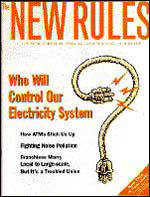Stacy Mitchell is a researcher with the New Rules Project of the Institute for Local Self-Reliance, a nonprofit organization that provides research, analysis, and innovative policy solutions for building healthy communities and strong, sustainable local economies. She is author of The Home Town Advantage.

Monday, 2 Oct 2000
TOLEDO, Ohio
I am at the airport, which seems to be the story of my life this past week, waiting to board a plane for the first of a two-leg journey home to Minneapolis.
I came to Toledo to participate in a panel discussion on “The Future of Independent Retail.” I was one of four speakers at the event put on by the Great Lakes Booksellers Association (GLBA) as part of their annual trade show and conference. I expected the session to be lightly attended; it was one of the last items on a four-day schedule. But instead we had a good turnout, nearly filling the hall.
GLBA is one of several regional trade associations of independent booksellers, people who’ve managed one way or another to survive the explosion of chain bookstores (Barnes & Noble and Borders Books), mass merchandisers (like Wal-Mart and Sam’s Club), and online retailers (Amazon.com). Many of their colleagues have not. Independent bookstores now account for just 15 percent of book sales, down from about 60 percent in the 1970s.
Every retail sector has undergone a similar transformation in the last decade as a handful of large corporate chains displace small, locally owned stores. Rite Aid, Walgreen’s, and CVS now control much of the pharmacy market, while more than 11,000 independent pharmacies have closed since 1990. Local hardware dealers are losing ground to Home Depot and Lowe’s. Blockbuster rents one out of every three videos. Five firms control one-third of grocery sales. A single firm, Wal-Mart, now accounts for 7 percent of all consumer spending.
That’s the bad news. But I came to Toledo primarily to talk about the good news. A growing number of people are fighting back. They are organizing to keep chain stores out of their communities and to support local retailers and healthy downtowns. Hundreds of communities have now said no to chain store developments, and many more are moving to do the same. In Arlington, Texas, citizens beat back a Wal-Mart. In Evanston, Ill., it was a Starbucks.
Best of all, many communities are now taking this fight beyond the defensive. Instead of fighting off these retail developments one by one, they are enacting proactive land use and zoning policies that protect the character of the community, limit retail sprawl, deter chains, strengthen local stores, and support humanly scaled, pedestrian-friendly business districts.

This is where the Institute for Local Self-Reliance (ILSR) comes in. My work with local retailers is part of ILSR’s New Rules Project. The premise of the New Rules Project is that many laws and policies in place at all levels of government are weakening communities, local economies, the environment, and democracy by fostering concentrated economic power and suppressing local authority. For example: trade policies that shift control of our economic and political future to distant, unaccountable, global powers (whether they be the WTO or Archer Daniels Midland); planning and zoning policies that encourage sprawling “big box” chain stores and unsustainable land use patterns; and state laws that strip towns of the right to say no to industrial hog farm operations. The list could go on.
We believe it’s time to change the rules. Since the inception of the New Rules Project three years ago, we’ve been researching and identifying model policies that support strong communities and sustainable, locally rooted economies. We work with activists and policymakers to help implement these new rules in communities around the country.
One of our biggest endeavors has been the creation of a searchable online collection of model rules — the New Rules website. It’s organized by sector. Under “Agriculture,” for example, you’ll find examples of legislation that can limit agribusiness and support small farms. Some of the rules are model policies; others are actual laws implemented by one or more towns, counties, or states. The full text of the law can be viewed and downloaded. The idea is to provide activists and policymakers with templates for enacting new rules in their own communities.
Under “Retail,” you’ll find examples of the kinds of policies I urged the audience of independent bookstore owners to push for in their own hometowns. Some communities, for instance, have banned retail development over a certain size, keeping out “big box” stores and giant shopping centers. Some require that proposals for new development undergo a comprehensive review. To pass, the developer must demonstrate that the new store will not have an adverse impact on such things as the environment, traffic, community character, and the local economy. Other communities have banned uniformity by adopting what are known as formula business bans.
All of these policies, as well as a detailed look at the negative impact chains are having on local economies and communities, are described in a book ILSR published this year: The Home Town Advantage: How to Defend Your Main Street Against Chain Stores and Why It Matters. As you might imagine, the book is widely available at independent bookstores.
Well, they’ve started the “pre-boarding,” which of course is utterly nonsensical. One either boards the plane or doesn’t. There’s no way to get on before getting on.
More tomorrow!
Tuesday, 3 Oct 2000
MINNEAPOLIS, Minn.
Much as it seems to do every year, fall has suddenly descended. It always feels as though it happens overnight. I wake up one morning, and the leaves have changed, the sky is overcast, and the wind is blowing from the north.
It used to be that we could count on having snow on the ground by Nov. 1. This is no longer the case. The winters here, as everywhere, have turned warmer. It’s strange to say, but I miss those dangerously cold, extended deep freezes that could last for days on end. They were exhilarating and part of what made Minnesota a unique place to live.
It’s nice to be home for an extended stretch. I don’t travel that much for work, but the last 10 days have been particularly hectic. In addition to Toledo, I took trips to Brunswick, Maine, and Atlanta, Ga.
I went to Maine to speak at a public forum on superstores organized by the city of Brunswick. There were eight speakers over two nights — some for, some against.

Local businesses take on the big chains.
Wal-Mart and other big chain retailers are now moving aggressively into Maine. They’ve targeted several mid-coast communities. Organized opposition has emerged in several of these towns and is beginning to make some headway. In Belfast, for instance, residents successfully urged the city to adopt a moratorium on all new retail development, allowing more time to study the impact of these big stores.
But Wal-Mart has also found support among some residents. Maine is one of the last frontiers for these corporate chains. It’s difficult to make a case against
them when people haven’t really seen what they do to communities. I wished I had brought along pictures from the Midwest of places where these big stores were built years ago.
It can be tempting for people to think that it’s possible to let Wal-Mart in and still retain downtown businesses. Often they are enticed by the developer’s promises of new jobs and tax revenue. But these gains are invariably offset by losses as the new store forces existing businesses to scale back operations or close down entirely.
Then there are the hidden costs of sprawl and auto dependency, the loss of indirect economic benefits as chains siphon revenues and profits out of the community, and the immeasurable decline of a cohesive community center built around a strong downtown retail economy.
I went to Atlanta to do a workshop with independent bookstore owners on local land use policies that can limit chain store development and support small, local retail. It was part of an annual conference held by the Southeast Booksellers Association. The best part I thought was the discussion afterwards.
One of the things that came up over and over again were the various ways in which public policy undermines local businesses and encourages economic concentration. Many, if not most, cities and towns provide tax breaks and subsidies for corporate retail development. At the federal level, independent booksellers are especially concerned about the policy exempting Internet retailers from collecting state and local sales tax. This essentially gives distant companies, who contribute nothing to the community, a 6 percent to 8 percent price advantage over local stores.

My favorite BIBA ad.
Most people believe the decline of independent businesses is simply the free market at work. But in many ways the playing field is tilted.
My workshop was held in conjunction with a presentation by Jeff Milchen, director of the Boulder Independent Business Alliance (BIBA), a two-year-old coalition of about 200 locally owned businesses. Its mission is to educate residents about the importance of supporting local stores. It does this through window decals and other material displayed at member stores, a guide to Boulder’s independent businesses, and advertisements in the local newspaper. My favorite ad is one that says, “You’re not a clone. Why shop at one?”
ILSR has worked with BIBA to help implement a set of local policies known as the Community Vitality Act. It would require the city to support local stores in several ways and would restrict new chain store development. They hope to have a city council vote on the measure in the next few months.
Wednesday, 4 Oct 2000
MINNEAPOLIS, Minn.
One of my goals today is to finish writing an article for the next issue of our quarterly journal, The New Rules.
I am writing about the Slow Food movement, an international effort to protect local foods and culinary traditions from mass standardization and industrial agriculture. In the words of its founder, Slow Food is an “eco-gastronomic” movement that sees small-scale local food production as essential to maintaining both biological and cultural diversity.

Slow Food now has more than 70,000 members organized into 400 local chapters in 40 countries. Initially I expected Slow Food to primarily be a European thing. It does have deep roots in that continent, but Slow Food is flourishing in the United States. Interest in this movement has gone hand-in-hand with the growth of organic foods, farmers markets, microbreweries, and artisan bread and cheese makers.
People involved in Slow Food, as you might imagine, take a fairly leisurely approach to returning phone calls, but hopefully I’ll finish up the interviews and the article in the next day or two.
Tomorrow we have a meeting to finalize some of the shorter pieces for the magazine. Most of the journal is staff written, though we periodically publish articles from outside writers. This will be our sixth issue. We’ve worked out the kinks and have developed a fairly smooth editorial and production process.

The New Rules focuses on solutions. The feature articles generally provide an in-depth analysis of a particular issue and outline various policy approaches for addressing the problem.
The upcoming issue will include a feature article by ILSR researcher and website manager Simona Fuma Shapiro on the global entertainment industry. She examines how big budget Hollywood movies are dominating distribution networks in other countries and squeezing out local films. Many countries have adopted laws that ensure that space and opportunities are reserved for homegrown cultural products. Simona takes a look at how these laws work and the threats posed to them by trade agreements and the WTO.
Another feature article by Brian Levy, our expert on farm policy, will explore supply management, a Canadian system for maintaining stable production levels and prices for farm products like chicken and eggs. Brian found that, although it is not without its flaws and challenges, the Canadian system is superior in many ways to the U.S. system of contract farming. Family farmers have a far more stable market, remain independent, and receive a fair price for their products.
We are also looking at several medium-length pieces for this issue: one on how state and local governments should embrace the Kyoto Protocol goals in publicly financed facilities; another on the Canadian health care system; and finally an article on devolving authority to local governments.
The hardest challenge in launching a magazine we’ve found is spreading the word and building a subscription base. Without advertising, we have a limited marketing budget and have had to be creative about finding ways to let people know about the journal. A number of the articles have been picked up and reprinted by other publications, which has been a big help.
Thursday, 5 Oct 2000
MINNEAPOLIS, Minn.
I made progress yesterday on the article I’m writing for The New Rules, but didn’t quite finish. The phone kept ringing; email kept downloading.
One call was from a woman in a small town in Michigan. The residents there fought Wal-Mart several years ago, but lost. Now developers are back with plans for hundreds of thousands of square feet of chain retail along a highway leading out of town. She’s hoping there’s a greater awareness now of what this kind of development does to communities than when Wal-Mart first arrived. She’s been distributing copies of The Home Town Advantage and helping to organize the opposition. She called to find out if I might be available to visit the town and speak.

Artwork: Ken Avidor
More news also came in yesterday from two communities in Iowa: Decorah and Mason City. I am scheduled to speak in Decorah in a few weeks. The group that invited me has been sending news clippings on the battles in both cities to stop the construction of Wal-Mart supercenters. These are gia
nt stores with the company’s standard merchandise, plus a full grocery. The stores are equivalent in size to about four or five football fields, not counting the acres of parking.
In Decorah, Wal-Mart wants to put one of these stores with all of its impervious asphalt on the flood plain of the Upper Iowa River. Unbelievably, the Department of Natural Resources (DNR) issued a permit for the construction. But Citizens for Responsible Development, a group of small business owners, environmentalists, and others concerned about the damage this store will do, filed a lawsuit challenging the DNR’s decision.
The judge has just granted a stay, meaning Wal-Mart can’t touch the site pending the outcome of the suit. The judge noted a “substantial legal or factual question exists as to the propriety of the [DNR’s] order.” A hearing on the case is scheduled for next week. I’ll be keeping my fingers crossed.
The fight in Decorah has been going on for two years. In Mason City, the Planning and Zoning Commission has already voted down Wal-Mart three times. But the corporation keeps rearing its ugly head. This is one of the challenges people who organize to stop these developments face. Corporate retailers are extremely persistent. They are crafty and have plenty of money. They will use every backdoor manipulation necessary to get their way.
This is one of the primary reasons ILSR recently started an electronic newsletter that covers efforts nationwide to stop chain store expansion and support local retail. The media largely ignores these local struggles. Activists often feel they are utterly alone, which has a way of wearing people down over time, exactly what these national chains want.
Our email newsletter, called The Home Town Advantage Bulletin, is designed to counter this by letting people know that they are not alone and bringing them stories from all over the country of people who are fighting back and winning. We also want the newsletter to provide local activists with a steady stream of research and information that can help them convince neighbors and local officials to support independent businesses and oppose absentee-owned retail development.
Above all, the newsletter urges communities to adopt new rules. Strong local land use policies can create permanent protections and prevent the need to fight off these stores one by one. Right now, much of the battle against chains is being fought as a kind of guerrilla warfare. ILSR’s aim is to help these local efforts expand and take proactive steps to protect the character and economic future of their communities.
Dozens of cities and towns are leading the way. To take a look at the kinds of policies they are adopting, visit the Retail section of the New Rules website.
Back issues of The Home Town Advantage Bulletin are available on the Bulletins page of our website, where you can also check out our other bulletins — Family Farm Rules Bulletin, ATM Surcharge Bulletin, and New Rules Project News.
If you’re interested in subscribing to The Home Town Advantage Bulletin (6 issues/year and it’s free!), just drop me an email at smitchell@ilsr.org.
Friday, 6 Oct 2000
MINNEAPOLIS, Minn.
Wow. I can’t believe it’s my last diary day. Many thanks to Grist for the opportunity to spread the word about what we’re up to. It’s a great magazine and it’s been fun to be a part of it.
And thanks to all the people who’ve written to me this week. I love getting feedback and hearing about what’s happening in your communities. You can drop me a line at smitchell@ilsr.org.
One letter came in this week from a former employee of Horizon Books in Traverse City, Mich. Chris writes that in the early 1990s a mall opened south of the city, triggering a spiral of decline in the downtown. Some businesses closed altogether. Others, including a big department store, moved out by the mall.
Horizon, a 40-year-old locally owned bookstore, decided to take a big gamble. It bought the vacant department store and opened a three-story bookstore, complete with cafe, Internet access, and space to host local artists, speakers, and community events. Horizon opted to do what no national chain would have done: invest in the future of downtown Traverse City.

Artwork: Ken Avidor
Today, Chris writes, downtown is once again flourishing. Horizon became a gathering place for the community. Other stores in turn began to open in the vacant spaces. Now the main streets are once again filled with businesses and activity.
In 1997, Horizon experienced several rocky months when Borders Books opened out by the mall and sales dropped sharply. But things turned around within a year. Perhaps customers realized that Horizon’s service is unbeatable. The book-loving staff has been around for years and really knows their stuff. Perhaps they also realized that Horizon, unlike Borders, is rooted in the community. It has made a commitment to Traverse City that extends well beyond just selling books.
The story of Horizon reminded me of another bookstore, one I visited this year, MainStreet BookEnds in Warner, N.H. The bookstore opened two years ago with two interrelated goals: to sell books, especially those with a local connection or appeal, and to create a space for community events. The store is located in a 250-year-old house with an attached barn. The barn has been beautifully renovated to accommodate author readings, lectures, concerts, art exhibits, college courses, and music and art classes.
MainStreet BookEnds wants to turn a profit, but that’s not all. “Our bottom line,” says coowner Katharine Nevins, “is to make an impact on where we live, something that gives back to the community.”
And therein lies the reason it’s so important to support our homegrown businesses. The tragic truth is that for every Horizon Books and MainStreet BookEnds, there are other stores, equally rooted in their communities, that have been forced to close their doors in recent years.
It’s time to reverse the tide. The future of our communities and local economies depends not only on the choices we make as consumers, in terms of where we spend our money, but on the choices we make as citizens. We need to demand that antitrust laws are enforced, that local officials stop courting chains with taxpayer money, that Internet businesses be forced to play by the same sales tax rules that govern local stores, and that land use policies be changed to keep chains out and support locally owned, humanly scaled businesses.
If you’d like to stay informed and participate in our efforts to do this, send me an email. I’d love to sign you up for any of our free electronic bulletins or The New Rules quarterly print journal ($15/year). You can learn more by visiting the New Rules website.
Thanks again.


